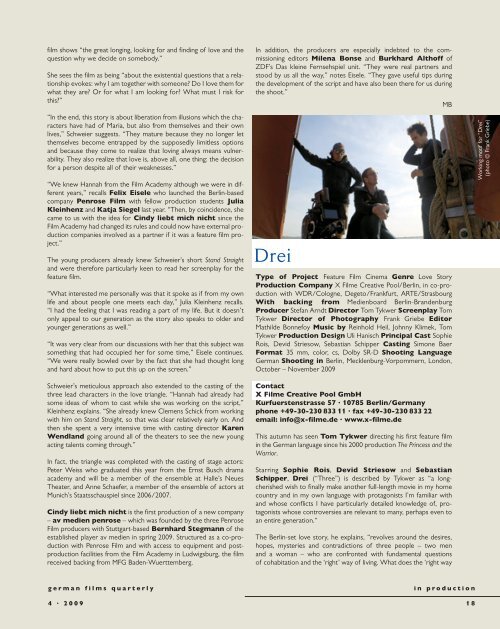Quarterly 4 · 2009 - German Films
Quarterly 4 · 2009 - German Films
Quarterly 4 · 2009 - German Films
Create successful ePaper yourself
Turn your PDF publications into a flip-book with our unique Google optimized e-Paper software.
film shows “the great longing, looking for and finding of love and the<br />
question why we decide on somebody.”<br />
She sees the film as being “about the existential questions that a relationship<br />
evokes: why I am together with someone? Do I love them for<br />
what they are? Or for what I am looking for? What must I risk for<br />
this?”<br />
“In the end, this story is about liberation from illusions which the characters<br />
have had of Maria, but also from themselves and their own<br />
lives,” Schweier suggests. “They mature because they no longer let<br />
themselves become entrapped by the supposedly limitless options<br />
and because they come to realize that loving always means vulnerability.<br />
They also realize that love is, above all, one thing: the decision<br />
for a person despite all of their weaknesses.”<br />
“We knew Hannah from the Film Academy although we were in different<br />
years,” recalls Felix Eisele who launched the Berlin-based<br />
company Penrose Film with fellow production students Julia<br />
Kleinhenz and Katja Siegel last year. “Then, by coincidence, she<br />
came to us with the idea for Cindy liebt mich nicht since the<br />
Film Academy had changed its rules and could now have external production<br />
companies involved as a partner if it was a feature film project.”<br />
The young producers already knew Schweier’s short Stand Straight<br />
and were therefore particularly keen to read her screenplay for the<br />
feature film.<br />
“What interested me personally was that it spoke as if from my own<br />
life and about people one meets each day,” Julia Kleinhenz recalls.<br />
“I had the feeling that I was reading a part of my life. But it doesn’t<br />
only appeal to our generation as the story also speaks to older and<br />
younger generations as well.”<br />
“It was very clear from our discussions with her that this subject was<br />
something that had occupied her for some time,” Eisele continues.<br />
“We were really bowled over by the fact that she had thought long<br />
and hard about how to put this up on the screen.”<br />
Schweier’s meticulous approach also extended to the casting of the<br />
three lead characters in the love triangle. “Hannah had already had<br />
some ideas of whom to cast while she was working on the script,”<br />
Kleinhenz explains. “She already knew Clemens Schick from working<br />
with him on Stand Straight, so that was clear relatively early on. And<br />
then she spent a very intensive time with casting director Karen<br />
Wendland going around all of the theaters to see the new young<br />
acting talents coming through.”<br />
In fact, the triangle was completed with the casting of stage actors:<br />
Peter Weiss who graduated this year from the Ernst Busch drama<br />
academy and will be a member of the ensemble at Halle’s Neues<br />
Theater, and Anne Schaefer, a member of the ensemble of actors at<br />
Munich’s Staatsschauspiel since 2006/2007.<br />
Cindy liebt mich nicht is the first production of a new company<br />
– av medien penrose – which was founded by the three Penrose<br />
Film producers with Stuttgart-based Bernhard Stegmann of the<br />
established player av medien in spring <strong>2009</strong>. Structured as a co-production<br />
with Penrose Film and with access to equipment and postproduction<br />
facilities from the Film Academy in Ludwigsburg, the film<br />
received backing from MFG Baden-Wuerttemberg.<br />
In addition, the producers are especially indebted to the commissioning<br />
editors Milena Bonse and Burkhard Althoff of<br />
ZDF’s Das kleine Fernsehspiel unit. “They were real partners and<br />
stood by us all the way,” notes Eisele. “They gave useful tips during<br />
the development of the script and have also been there for us during<br />
the shoot.”<br />
MB<br />
Drei<br />
Type of Project Feature Film Cinema Genre Love Story<br />
Production Company X Filme Creative Pool/Berlin, in co-production<br />
with WDR/Cologne, Degeto/Frankfurt, ARTE/Strasbourg<br />
With backing from Medienboard Berlin-Brandenburg<br />
Producer Stefan Arndt Director Tom Tykwer Screenplay Tom<br />
Tykwer Director of Photography Frank Griebe Editor<br />
Mathilde Bonnefoy Music by Reinhold Heil, Johnny Klimek, Tom<br />
Tykwer Production Design Uli Hanisch Principal Cast Sophie<br />
Rois, Devid Striesow, Sebastian Schipper Casting Simone Baer<br />
Format 35 mm, color, cs, Dolby SR-D Shooting Language<br />
<strong>German</strong> Shooting in Berlin, Mecklenburg-Vorpommern, London,<br />
October – November <strong>2009</strong><br />
Contact<br />
X Filme Creative Pool GmbH<br />
Kurfuerstenstrasse 57 <strong>·</strong> 10785 Berlin/<strong>German</strong>y<br />
phone +49-30-230 833 11 <strong>·</strong> fax +49-30-230 833 22<br />
email: info@x-filme.de <strong>·</strong> www.x-filme.de<br />
This autumn has seen Tom Tykwer directing his first feature film<br />
in the <strong>German</strong> language since his 2000 production The Princess and the<br />
Warrior.<br />
Starring Sophie Rois, Devid Striesow and Sebastian<br />
Schipper, Drei (“Three”) is described by Tykwer as “a longcherished<br />
wish to finally make another full-length movie in my home<br />
country and in my own language with protagonists I’m familiar with<br />
and whose conflicts I have particularly detailed knowledge of, protagonists<br />
whose controversies are relevant to many, perhaps even to<br />
an entire generation.“<br />
The Berlin-set love story, he explains, “revolves around the desires,<br />
hopes, mysteries and contradictions of three people – two men<br />
and a woman – who are confronted with fundamental questions<br />
of cohabitation and the ‘right’ way of living. What does the ‘right way<br />
german films quarterly in production<br />
4 <strong>·</strong> <strong>2009</strong> 18<br />
Working motif for “Drei”<br />
(photo © Frank Griebe)

















